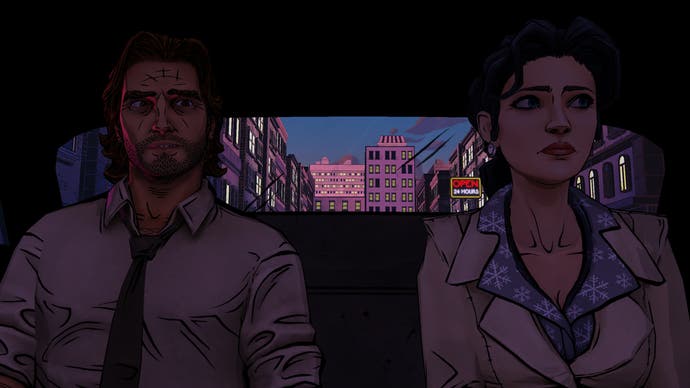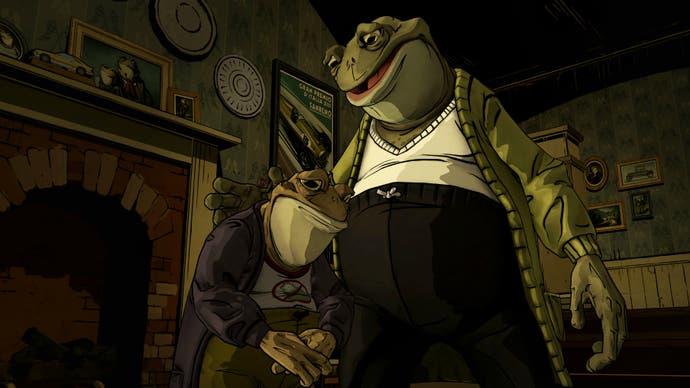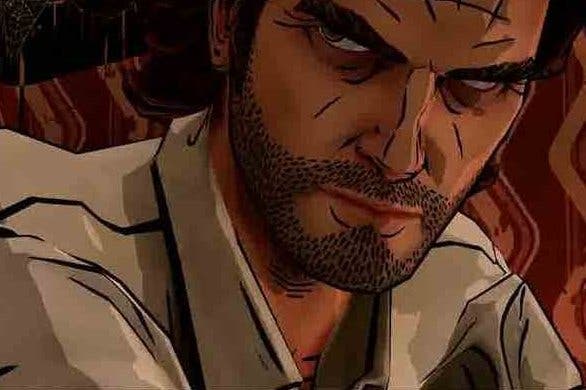Games of 2014: The Wolf Among Us
Nobody's listening.
When I think about the events that came to dominate the news this past year, two words come to mind - desperation and confusion. This was the year that political tensions, brewing for decades, finally bubbled over. And yet, as I thumb through comprehensive explanations of all the little steps that led to the formation of ISIS, of Putin's renewed bullishness, of the galvanization of class roles throughout the first world, it's practically deterministic. "Of course," I say to myself. "What did we think would happen?"
The Wolf Among Us reminds me that we can't ever really predict these sorts of things, at least not in their totality. We're trying to discuss history from within history, and that robs us of the perspective needed to solve our own problems, or look beyond the next paycheck.
Ostensibly, the story of the Telltale's neo-noir crime drama is that of larger-than-life fairy tale characters, struggling to make their way in 1980s New York City. Initially, at least, this is certainly the case. By the second of five episodes, however, the real battle lines are clear, and the underlying tensions that have constructed the hell that all of these people are enduring start to assert themselves.
From inside the body of Sheriff Bigby Wolf, time and time again, I recall gazing into the pained, weary eyes of my wards, wanting to scream, "Why Didn't You Tell Me It Was This Bad?!" The answer to my plea is, of course, that they did. They begged and they cried. They did everything they were supposed to. They were good people that ran dry of good options. A lawman I may be, but I have no right to judge the forlorn and the lost.
So where does that leave me?
As I trudged through this tiered murder mystery craving justice, I kept hitting walls built of the souls I had abandoned, the people I had failed to protect. Instead of seeking the safety and protection of the law, they found cold silence and reified the stinging realization that no one listened. They fell into the manipulative embrace of criminals and hit men. "Of course", I say to myself. "What did I think would happen?"

The Wolf Among Us questions the notion that any story really has a beginning. It seems to start reasonably enough: Bigby Wolf is a sheriff, and the first episode ends with the murder you'll spend the rest of the season trying to untangle. But the more I think about our own world, I realize that no story truly has a beginning. All of these tendrils of history, these personal stories, wind together to create this tragic tapestry that tells the story of human beings on Earth. Even that's not the whole of it. In Bigby's world, as in ours, there are no accidents because everything, absolutely everything, has a cause.
The diaspora of the fables, scattered as they are in the decaying city core of 1980s New York, create this palpable sense of political and economic struggle. Some are born into privilege - those like Beauty or Snow White. Because they look human, they don't have to obscure their true form with expensive magic. Others are required to purchase spells called "glamours" to interact with anyone outside of their very small enclave. For them, hardship is a given. Superficially, reasonable laws create and ultimately cement power structures that never used to exist. Old class systems from the fables' time as legends are fairy tales rarely crossing into the 20th century successfully.
It's an apt analogy for colonialism and the tyranny of aristocracy. While most people began on a largely equal footing at some very distant point in time, as our species has marched forward, some have inevitably been left behind. When they turn to desperate tactics for survival, they're blamed for the injustice that had them bound to begin with.
As the mystery wears on, Bigby Wolf, the human form of the legendary Big Bad Wolf, comes closer to showing us who he really is. Caught between his cannibalistic past, keeping a strained peace alive, extracting his particular brand of pseudo-vigilante justice, and even his own survival, he - which is to say we - lash out against the dangerous and the unjust. Precisely at first, but growing more erratic as the weight of his absolute deficiency crystallizes before us.

I don't know that I'd call The Wolf Among Us an elegant metaphor. It is, however, hauntingly poignant, particularly in 2014. As it's plot is laid bare, all of the scripts for the game's actors come together in this delightfully tragic play. We come to realise that the sense of power and control that we're afforded was always an illusion, because from the beginning we're pushed forward by forces set in motion long ago.
It's hard for me not to come away from The Wolf Among Us feeling disempowered or fatalistic. Even at its climax, when we as Wolf assert all the agency we can muster, the revelation that we've been manipulated the whole time undercuts the infantile delusion of power.
I've played countless games in my life. Devil May Cry made me feel like a badass. Mario made me feel invincible. Killer7 made me feel insane. None has ever made me feel like I had so much, even as the transparency of my helplessness was made repeatedly and aggressively clear.
And what's wrong with that? Yes, the reality of history is harsh, but it's also peppered with the kindnesses of those who listened. Manipulated as Bigby may have been, some twisted form of good does eventually surface. It's delicate and imperfect, but it's a start.









